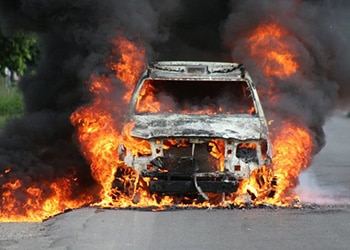A recent series of shootouts with police near one of Venezuela’s most infamous prisons is a reminder of the control wielded by criminal groups from within penitentiaries and beyond, and the government’s lack of control over them.
On October 9, prisoners inside Tocorón in the state of Aragua opened fire on a group of police officers traveling on the road across from the jail.
According to the official police account, the prisoners fired from the prison gates, severely injuring two police officers and damaging a police vehicle, which prisoners later overturned and set aflame.
The initial exchange of gunfire was captured in the video below, which shows officers exchanging fire with prisoners and ducking behind their vehicle for cover.
Video: Así fue como desde Tocorón internos le dispararon al Cicpc. Tres detectives resultaron heridos y una unidad incendiada pic.twitter.com/UGVnMq9Gvs
— Daniel G. Colina (@danielgcolina) October 10, 2017
(Courtesy of Daniel G. Colina)
A third officer was also injured during a second wave of gunfire after a backup police unit approached the prison gates.
Tren de Aragua — the criminal group that opened fire from the prison — released a public statement on the messaging application WhatsApp, seen by InSight Crime, following the shootout.
In the statement, the Tren de Aragua claimed the incident was in retaliation for alleged “attacks,” “robberies” and “kidnappings” committed by local police against prisoners’ family members. The group threatened that they will continue to “defend” their family members “whatever the price” and boasted that their criminal structure extends beyond the Tocorón prison to “all of Aragua and a large part of the country.”
The police officers attacked during this shootout were on their way to aid in the investigation of an attack on a police checkpoint in Aragua the day prior. Authorities say that strike was allegedly carried out by members of the “Bola” criminal gang known for slaying police officers. The ensuing shootout led to the deaths of alleged “Bola” members with the aliases “Gregorio” and “Niño Cagua.”
Venezuela’s Attorney General’s Office has opened an investigation into the shootout at Tocorón prison.
InSight Crime Analysis
The brazenness of the recent attacks against police illustrate the extent of the power wielded by these groups and the government’s lack of ability, or will, to take control.
As InSight Crime has previously reported, the expansive Tren de Aragua group headquartered in Tocorón is considered to be one of the most powerful criminal structures in Venezuela. Run by bosses called “pranes,” it has inspired and now commands “megabandas” around the country, as do other prison gangs in other penitentiaries around the country.
SEE ALSO: Investigation of Venezuela Prisons
Luis Cedeño, the director of the NGO Paz Activa which studies organized crime in Venezuela, told InSight Crime that the power of the criminal structures comes from a combination of a lack of state control and clear coordination between criminals in prison and on the streets.
“Tocorón is a prison completely co-opted by criminal organizations. State control is minimal which has allowed it to become a significant illegal economy that maintains direct and dynamic communication with megabandas” outside of the prison, he said, adding that a major reason the recent shootout and car burning was even possible is that prisoners run the jail and can decide freely when to walk out of its gates.
“Many of the criminals in the prison have an open door to enter and exit at their will,” Cedeño said. “The radius of their activities goes beyond the prison walls … They control almost everything and police cannot approach the prison without receiving permission from the pranes in charge.”
Carlos Nieto Palma, a lawyer who heads the prison observatory organization “A Window to Liberty” (Una Ventana a la Libertad), went a step further and told InSight Crime that state collusion, and not just neglect or lack of control, allows for these criminal structures to do as they please in Venezuela’s prisons.
“These prisoners come out onto the street because the authorities let them,” Nieto Palma said. “It’s a problem of corruption. Until we fix that, Venezuela’s penitentiary system will remain … the worst on the continent.”
Both Cedeña and Nieto Palma suggested that one way to tackle these problems would be to cut off the communication channels between criminals inside and outside of jails by implementing a law passed earlier this year to block telephone and internet signals in prisons. Authorities have faced criticism for not yet implementing the measure. With prisons like Tocorón already under the control of armed criminal structures, it seems unlikely that this law will be followed through effectively.

